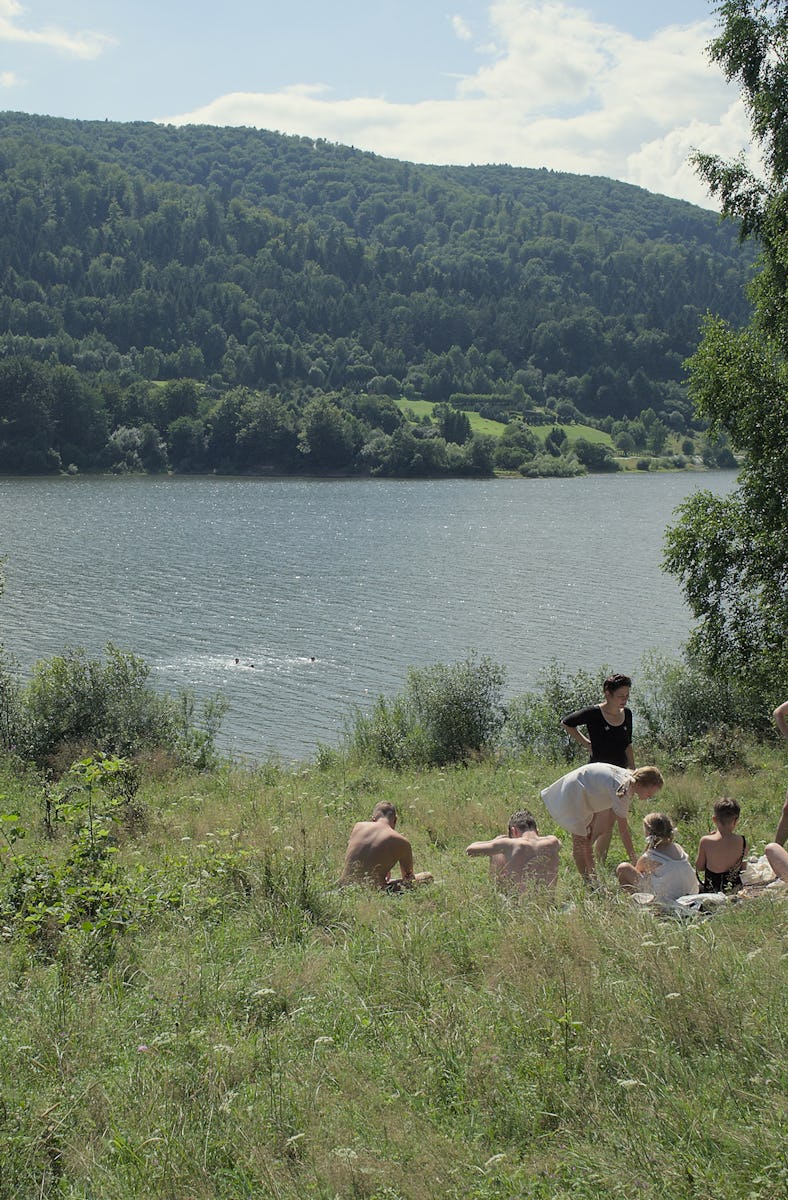Little Moments, Big Statements in The Zone of Interest
It’s more than just the banality of evil.

A scene of disturbed slumber underscores a central point of Jonathan Glazer’s The Zone of Interest: Hedwig Höss (Sandra Hüller), wife of Auschwitz commandant Rudolf Höss (Christian Friedel), invites her mother, Linna (Imogen Kogge), for a visit to their sprawling and stately farmhouse; one might call the estate “idyllic” were it located somewhere, anywhere, other than a concentration camp’s backyard.
At first, Linna brims with pride for her daughter’s success: “You’ve certainly landed on your feet,” she tells Hedwig after strolling through the house. Never mind that they’re standing, figuratively and not quite literally, on the bones and ashes of Jewish prisoners murdered next door. Never mind that Linna abruptly wakes up from a backyard snooze coughing up a lung, an effect of the smoke plumes billowing nonstop from Auschwitz’s chimneys. And never mind that Linna recognizes Hedwig’s drapes as having belonged to the Jewish woman she once cleaned for, and who is now most likely fertilizer for the Hösses’ gardens. It doesn’t matter how Hedwig built her wealth. It only matters that she did.
Then Linna turns in for the night and is roused from bed by an angry red light — a much harsher proof of Auschwitz’s horrifying efficacy than columns of smoke. The knowledge of what Auschwitz is for isn’t a deal breaker for Linna — not by itself. It takes an up-close observation of the charnel engine in action to make her balk and, the morning after, get the hell out of the Hösses’ home, leaving behind only a short note of farewell.
Glazer doesn’t show the audience what it says, but judging by Hedwig’s chafed reaction — she burns it — Linna’s parting words aren’t flattering. The Zone of Interest doesn’t treat this sequence as exoneration for Linna, though. Rather, it’s a dividing line separating the Hösses from people whose homes don’t border an extermination camp. Once she sees Auschwitz for herself, even from the relative comfort of the Höss residence, Linna can’t reconcile the function it serves as “normal.” If she’s amenable to the mass murder of the Jewish prisoners within its walls, she’s put off by an outside glance at where the murder happens.
Hedwig’s blasé attitude throughout Zone of Interest is the purpose of the film.
To the Hösses, though, it’s all normal: the smell of death, so strong that the lilac bushes can’t cover it; the curt pop of rifle reports barreling through the air, accompanied by the screams of those doomed to die; the barbed wire perched atop their fence; the assurance that Rudolph possesses immense power, and that power is enough to insulate him and his family from Auschwitz’s grim reality and their complicity in shaping that reality.
Much of The Zone of Interest’s coverage at least passingly acknowledges “the banality of evil” — a concept introduced by German-American historian and philosopher Hannah Arendt in her book Eichmann in Jerusalem: A Report on the Banality of Evil, about the trial of chief Holocaust architect Adolf Eichmann. These references are reasonable. Like Eichmann, the Hösses’ behaviors aren’t “ordinary” by any means, they’re merely informed workday cultural apathy. In Arendt’s calculus, Eichmann wasn’t motivated to engineer the near-extermination of the Jewish people by a personality disorder. He just wanted to move up in the world. He wanted success.
Rudolph and Hedwig exhibit the same wants, but Glazer suggests that “banality” can be expanded on. There’s nothing normal about the Hösses. Claus has a tooth collection; during a game of hide-and-seek, Hans holes up in the greenhouse, and Claus, rather than find him, holds the doors shut while mimicking the sound of a gas chamber; Hans himself imitates the cracking sound of that ever-present rifle fire; one of Rudolph’s daughters is a habitual sleepwalker; Hedwig menaces a housekeeper who displeases her by warning her that Rudolph “would spread your ashes across the fields of Babice.”
All of this is expected from Nazis, one of pop culture’s favorite villains. Dehumanizing the Third Reich on screen is a cherished victimless crime. The Zone of Interest, however, humanizes them by steeping in their inhumanity. To a 2024 audience, the Hösses may appear monstrous to varying degrees. Glazer opts to stay at a remove from them — the movie largely comprises medium shots with occasional wide shots for good measure — to cast their humanity in a sharp relief. They’re human, alright, even normal, but only because they’re members of a society that has normalized the industrialized slaughter of humans deemed “less than” by the ruling class.
The Zone of Interest’s treatment of cinema’s favorite villains, Nazis, is revolutionary.
What The Zone of Interest subtly argues, though, is that the longer one lives in such a society, the further they drift from any semblance of normalcy, even within a societal context. Normal people, even in the world of Nazis, don’t play with teeth at bedtime. Nor do they show up at a soiree and puzzle out in their heads the best way to gas everyone in attendance, which Rudolph confesses to doing in a phone call with Hedwig following an SS Main Economic and Administrative Office event.
Rudolph’s casual admission is chilling regardless of his status within the Nazi Party, and alters our perception of him on a second viewing, too. In quieter moments, where no dialogue is spoken, what other thoughts might cross his mind that are too shocking even for his own political allies? Glazer’s observations of the entire Höss clan in The Zone of Interest are necessary for mining new meaning from the banality of evil, with Rudolph being particularly crucial. Rudolph isn’t ordinary, and neither is his family, they are the norm. But that’s only because they live in a society where the psychosis of antisemitism is normal, too.